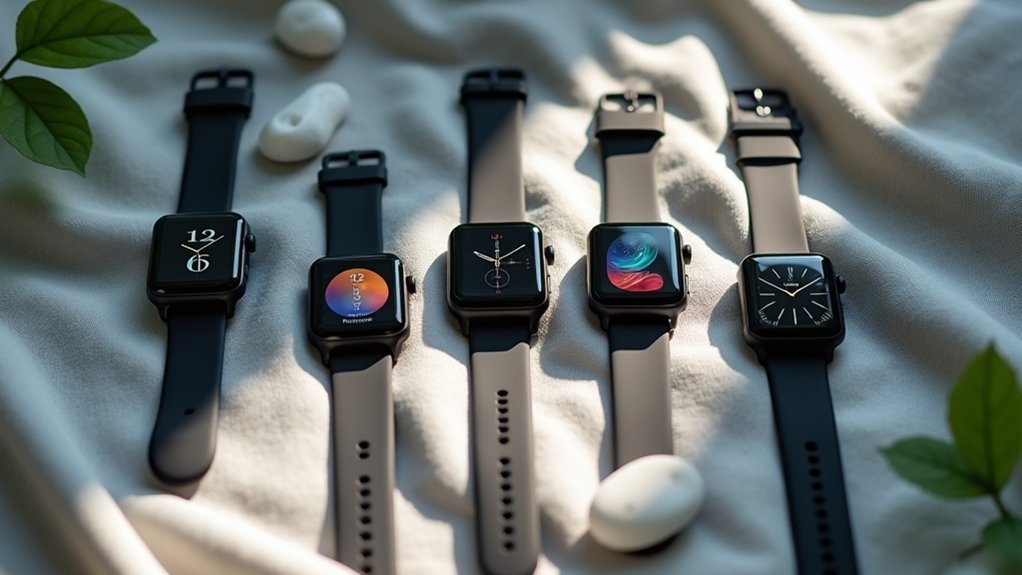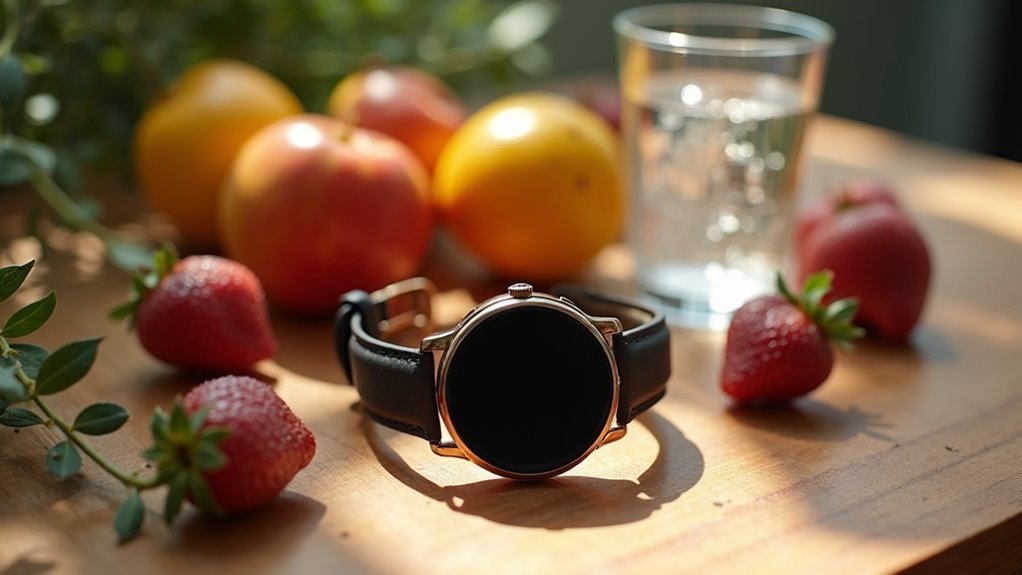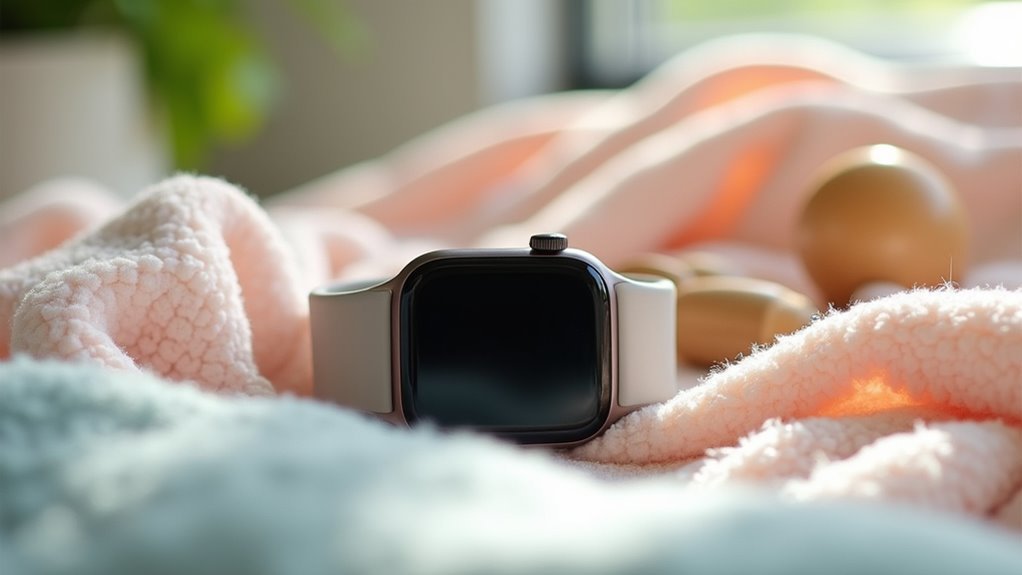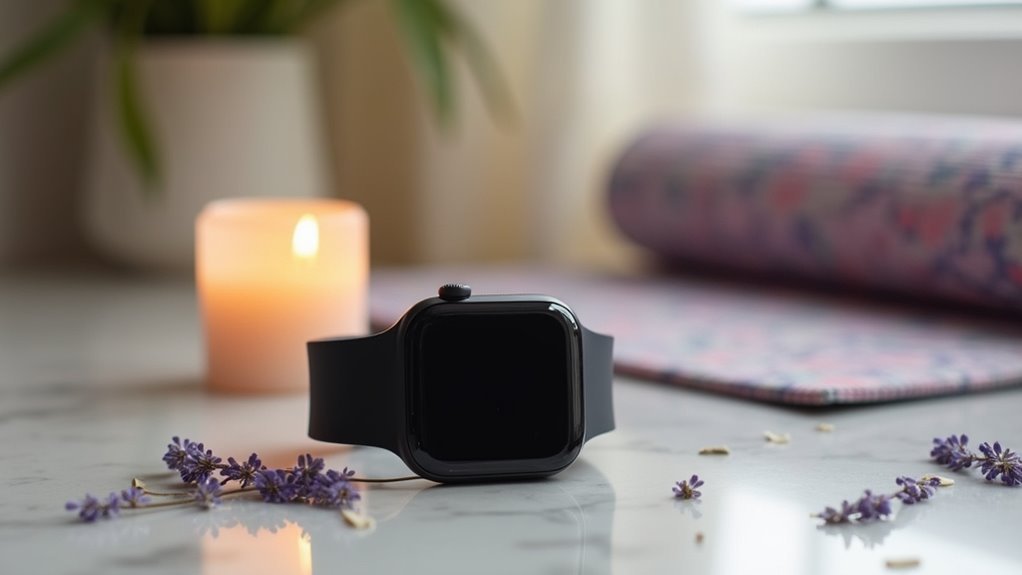You’ll want the Fitbit Sense 2 for its advanced electrodermal activity sensor that continuously monitors stress through skin responses, or the Samsung Galaxy Watch 5 for real-time heart rate variability tracking with intelligent alerts. The Fitbit Charge 5 offers precise EDA detection in a compact band, while Garmin Fenix 7 provides extensive multi-sensor stress assessment with Body Battery metrics. Consider the affordable Amazfit GTS 2, Apple Watch Series 8’s mindfulness features, or Polar Vantage V2’s professional-grade monitoring to discover which stress management approach fits your lifestyle best.
Fitbit Sense 2: Advanced EDA Sensor Technology for Comprehensive Stress Tracking
When it comes to cutting-edge stress monitoring technology, the Fitbit Sense 2 stands out with its continuous electrodermal activity (cEDA) sensor that tracks your body’s physiological stress responses throughout the day.
Unlike previous models requiring manual activation, this sensor automatically detects subtle electrical changes in your skin from sweat gland activity, providing passive stress monitoring.
You’ll receive notifications when stress responses are detected, prompting you to log your mood and context. The mood logging feature offers eight distinct options including stressed, frustrated, worried, sad, calm, content, happy, and excited, allowing you to track emotional patterns alongside your physiological responses.
The system combines cEDA data with heart rate, heart rate variability, and skin temperature for enhanced accuracy.
The Fitbit Sense 2 integrates multiple biometric signals—cEDA readings, heart rate patterns, variability metrics, and skin temperature—to deliver precise stress detection capabilities.
Your stress management score calculates based on several days of body responsiveness data, while the exertion balance feature shows how stress impacts your recovery and physical performance.
Samsung Galaxy Watch 5: HRV Monitoring With Real-Time Stress Feedback
You’ll get continuous heart rate variability monitoring that tracks your stress levels throughout the day without manual input.
The watch alerts you when stress spikes occur, helping you catch tension before it becomes overwhelming.
When stress hits, you can immediately access guided breathing exercises right from your wrist to regain control. All your stress measurements sync to Samsung Health app where you can view trends and track your progress over time.
Real-Time HRV Tracking
The Samsung Galaxy Watch 5 delivers extensive HRV monitoring through its advanced PPG sensors that collect data at a 20Hz sampling rate, providing you with real-time insights into your stress levels throughout the day.
You’ll get the most accurate readings when you’re calm, still, and wearing the watch snugly on your wrist.
The device automatically takes measurements throughout the day, though it won’t monitor during sleep or vigorous activity. The Samsung Watch series is compatible with specialized HRV measurement apps that require proper connectivity setup.
You can also trigger real-time measurements by pressing a button when you need immediate stress feedback.
The gyroscope and accelerometer data enhance measurement reliability, ensuring you receive consistent HRV tracking.
When paired with apps like Welltory, you’ll access detailed stress and recovery insights based on your personal HRV patterns over time.
Stress Alert System
Building on its extensive HRV tracking capabilities, Samsung’s Galaxy Watch 5 takes stress management further with an intelligent alert system that notifies you when your stress levels spike beyond your normal range.
The watch uses advanced algorithms to analyze your PPG signals in real-time, converting them into frequency domains to assess HRV parameters like HF, LF, and LF/HF ratios.
When stress levels rise, you’ll receive immediate notifications through the user-friendly Samsung Health interface.
The system doesn’t just alert you—it provides personalized recommendations for managing your stress, including mindfulness reminders and breathing exercises. For optimal accuracy, maintain consistent conditions during measurements as this ensures meaningful data interpretation and reliable stress level comparisons.
You can customize alert thresholds based on your specific heart rate patterns, enabling proactive stress management that helps you respond before stress becomes overwhelming.
Guided Breathing Exercises
When your Galaxy Watch 5 detects elevated stress levels, it automatically prompts you to engage in guided breathing exercises designed to activate your parasympathetic nervous system and restore balance. These timed sessions feature visual cues and on-screen animations that guide you through specific inhaling and exhaling intervals. You’ll receive immediate feedback through color-coded stress scores and gentle vibrations, helping you understand your body’s response.
| Breathing Pattern | Duration | Visual Cue |
|---|---|---|
| 4-7-8 Technique | 2-5 minutes | Expanding circle |
| Box Breathing | 3-6 minutes | Square animation |
| Deep Belly | 1-4 minutes | Wave motion |
| 4-4-4 Pattern | 2-7 minutes | Triangle guide |
| Custom Rhythm | User choice | Personalized |
You can customize session length and repeat exercises as needed. This integrated Samsung Health feature requires no additional apps, making stress management accessible directly from your wrist. The stress monitoring data contributes to your daily Energy Score, providing insights into your perceived energy levels throughout the day.
Fitbit Charge 5: Precise Electrodermal Activity Detection in a Fitness Band Format
Several fitness trackers promise stress monitoring, but Fitbit’s Charge 5 delivers genuine electrodermal activity (EDA) detection in a sleek fitness band format.
You’ll find the dedicated EDA sensor tracks changes in your sweat levels, providing stress scores from 0 to 100. To use this feature, you’ll complete three-minute sessions with on-screen breathing prompts that guide you through the measurement process.
The device combines this stress monitoring with continuous heart rate tracking and built-in GPS in a premium design featuring anodized aluminum housing and surgical-grade stainless steel. The fitness tracker is water resistant up to 50 meters, making it suitable for swimming and various weather conditions.
You’ll get up to seven days of battery life, and the 1.04-inch AMOLED display adjusts brightness automatically. At $179.95, you’re investing in precise stress detection technology that surpasses basic heart rate variability measurements found in competing fitness bands.
Garmin Fenix 7: Multi-Sensor Stress Assessment With Advanced Body Metrics
You’ll find the Garmin Fenix 7 takes stress tracking to the next level with its extensive multi-sensor approach that goes far beyond basic heart rate monitoring.
The watch combines advanced heart rate variability analysis with Body Battery metrics, pulse oximeter data, and sleep monitoring to create a complete picture of your physiological stress responses.
This integrated system doesn’t just tell you when you’re stressed—it shows you exactly how that stress impacts your overall energy reserves and recovery patterns throughout the day. The device displays stress levels on a 0-100 scale where readings from 0-25 indicate a resting state, while scores above 76 signal high stress requiring attention.
Advanced Body Metrics Tracking
Although many smartwatches offer basic health tracking, the Garmin Fenix 7 elevates stress management through its sophisticated multi-sensor approach that continuously monitors your body’s physiological responses.
You’ll benefit from thorough Heart Rate Variability analysis that reveals your stress levels and recovery status in real-time. The innovative Body Battery feature combines HRV data with sleep quality, stress measurements, and activity levels to determine your overall energy reserves throughout the day.
You can track blood oxygen saturation levels, which proves invaluable for understanding how altitude and environmental factors affect your stress response.
The watch’s Training Load measurement assesses workout impact on your body, while Recovery Time Analysis helps you plan ideal rest periods. The device also provides Performance Condition assessments in real-time after 6 to 20 minutes of activity, comparing your current state to your average fitness level. This multi-metric approach provides actionable insights for data-driven stress management decisions.
Multi-Sensor Stress Detection
The Garmin Fenix 7’s stress detection system combines multiple sensors to create an extensive picture of your physiological state beyond individual metrics.
You’ll get stress readings on a 1-100 scale through a three-minute HRV test while standing still. The watch uses its built-in wrist HRM for convenient monitoring, though you can connect a chest HRM for enhanced accuracy through the dedicated HRV Stress app.
Your breathing rate gets monitored alongside stress levels, providing deeper insights into your body’s responses. The system integrates ECG monitoring on supported models, recording detailed heart activity patterns. These comprehensive readings help you assess readiness for upcoming training sessions or recovery activities.
You can access stress data quickly through the glances feature and customize data screens for better management insights. However, you might experience sensor interference from other connected devices affecting app performance.
Amazfit GTS 2: Affordable Stress Management With Heart Rate Variability Analysis
When budget constraints meet stress management needs, the Amazfit GTS 2 delivers impressive functionality without breaking the bank. You’ll get automatic stress monitoring every five minutes, providing detailed insights through the Zepp app. The device combines heart rate variability analysis with real-time cardiovascular monitoring to track your stress patterns effectively.
Your stress awareness improves with continuous monitoring and clear indicators displayed on the vibrant AMOLED screen. The watch supports over 90 sports modes, helping you release tension through physical activity, while 5ATM water resistance guarantees durability during workouts. The 246mAh battery provides up to 7 days of use, ensuring consistent stress monitoring without frequent charging interruptions.
| Feature | Benefit |
|---|---|
| Automatic Stress Monitoring | Tracks stress every 5 minutes |
| Heart Rate Variability | Real-time cardiovascular insights |
| 90+ Sports Modes | Stress-relieving activity options |
This affordable option makes thorough stress management accessible to budget-conscious users.
Apple Watch Series 8: Integrated Mindfulness Features and Stress Notifications
Apple’s flagship wearable transforms stress management into an intuitive, always-accessible experience through its sophisticated mindfulness ecosystem.
You’ll find guided breathing exercises directly accessible from your watch face, offering customizable sessions that sync across all your devices. The Series 8’s extensive health tracking monitors heart rate variability and physical activity, providing essential stress indicators throughout your day.
You can set personalized stress alerts with adjustable thresholds, receiving timely notifications through vibrations or visual cues when stress levels spike.
Third-party apps like Stress Monitor and StressWatch enhance capabilities with AI-powered mood tracking. Calendar integration helps you identify stress triggers by correlating elevated levels with specific events.
Third-party applications leverage artificial intelligence to track emotional patterns and identify environmental stress triggers through intelligent calendar correlation.
The seamless Health app integration offers detailed analytics, while meditation apps like Headspace provide guided relaxation programs for thorough stress management. Advanced apps can track your sleep patterns and analyze how rest quality directly impacts your daily stress levels and overall emotional well-being.
Polar Vantage V2: Professional-Grade HRV Tracking for Stress Recovery Monitoring
While most smartwatches offer basic heart rate monitoring, Polar’s Vantage V2 delivers professional-grade HRV tracking that elevates stress recovery monitoring to clinical standards.
You’ll get precise HRV measurements at 1000Hz sampling rates, with data validated against Polar’s H10 chest strap for maximum accuracy.
The watch’s Nightly Recharge feature analyzes your 4-hour average heart rate and RMSSD values, providing thorough recovery insights each morning.
You can perform orthostatic tests to assess your cardiovascular system’s recovery status after intense training sessions.
At AU $800, the Vantage V2 uses LnRMSSD analysis for sophisticated HRV tracking that helps you understand your stress levels and recovery capacity. The device tracks your autonomic nervous system balance, measuring the interplay between your sympathetic and parasympathetic responses to optimize your training and recovery decisions.
With 400-hour battery life in power-saving mode, you’ll maintain continuous monitoring without frequent charging interruptions.
Frequently Asked Questions
How Accurate Are Smartwatch Stress Measurements Compared to Medical-Grade Devices?
You’ll find smartwatch stress measurements are less accurate than medical-grade devices. While medical ECG devices achieve higher precision, your smartwatch’s PPG technology only provides 40-80% accuracy due to motion artifacts and algorithm variations.
Can Stress Tracking Smartwatches Help Prevent Anxiety Attacks or Panic Disorders?
You can’t prevent anxiety attacks or panic disorders with smartwatches alone. They’ll help you recognize stress patterns and practice self-regulation through guided breathing, but you’ll need professional mental health support for thorough treatment.
Do Different Smartwatch Brands Show Consistent Stress Readings for the Same Person?
No, you’ll likely see inconsistent stress readings between different smartwatch brands. Each uses unique algorithms for analyzing heart rate variability, so your stress levels can vary considerably across devices even simultaneously.
How Long Should I Wear a Smartwatch Daily for Reliable Stress Monitoring?
You should wear your smartwatch for at least 12 hours daily, though all-day wear during waking hours provides the most reliable stress data and thorough trend analysis.
Are There Privacy Concerns With Smartwatches Collecting and Storing Stress Data?
Yes, you’ll face privacy risks when your smartwatch collects stress data. Your sensitive health information could be shared with third parties, vulnerable to breaches, or misused without your knowledge or consent.





Leave a Reply